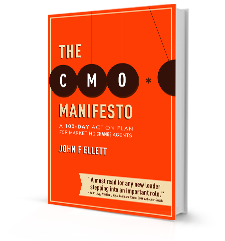 A couple of months back, my friend John Ellett gave me a copy of his book, ‘The CMO Manifesto‘ which I thoroughly enjoyed. The book is the outcome of 50 interviews with CMOs to identify the best practices for the first 100 days of a CMO joining a new company. It turns out, The CMO Manifesto ends up being a very complete and modern description of the role of a modern marketing leader.
A couple of months back, my friend John Ellett gave me a copy of his book, ‘The CMO Manifesto‘ which I thoroughly enjoyed. The book is the outcome of 50 interviews with CMOs to identify the best practices for the first 100 days of a CMO joining a new company. It turns out, The CMO Manifesto ends up being a very complete and modern description of the role of a modern marketing leader.
Establishing the role of marketing, a manifesto for a modern marketing leader, and best practices for marketing leaders in new roles is important because of four reasons:
- The average tenure of a CMO is around 24 months.
- Marketing is becoming more complex.
- Most of the organization, including the leadership team, have a distorted, inaccurate or unclear understanding of the marketing role.
- Leaders are realizing how fundamental and strategic Marketing is for the success of any business. As Peter Drucker said “Marketing is the distinguishing, unique function of the business.”
Some of the more interesting points in the book I especially agree with:
- Marketing leaders are change agents for the company
- As leaders they impact strategy, revenue and the overall success of an organization
- Focus and clarity (clear priorities) are especially important for a marketing team
- Customer insights should guide all decisions
- Vision, optimism and resiliency are essential traits of a good marketer
John organizes the book in 12 best practices for a marketing leader:
- Lead positive change
- Bring clarity and inspiration
- Build Relationships and trust
- Channel the voice of the customer and Insights
- Focus leads to greatness
- Drive agility and accountability
- Build capable, committed, collaborative teams
- Find the balance between chaos and process
- Do plan but focus on action
- Continuously measure and optimize
- Leverage new tools and technologies
- Remain resilient in front of challenges
Another thought leader, Ashley Friedlein, from eConsultancy recently published an update to his Modern Marketing Manifesto, which also happens to have 12 points. This manifesto has a slight digital marketing bias but is quite compatible with John Ellett’s point of view: There are many similarities and a few points that can be complementary :
- Strategy. Marketers should sit at the board table and set strategy. Strategy is shaped by knowledge of markets, products, customers and positioning. Digital needs to be part of every strategy.
- Revenue. Marketers must be accountable for revenue, have a common point of accountability with sales, and must understand P&L.
- Customer experience. Improving CX for the most valuable customers must be the relentless focus of modern marketing.
- Integration. Customers do not understand the distinction between mobile and desktop, online and offline, above and below the line. Marketing must focus on providing an integrated customer experience.
- Brand. Consumers control the message, forcing brands to be authentic and transparent.
- Data. Marketers must turn data into insight and action – hence the importance of research, marketing automation, predictive analytics, etc.
- Personalization. Relevance and optimization to each customer and his context.
- Technology. Marketers will have increasing ownership if the technology tools.
- Creative. We need creativity just as mush as we need technology.
- Content. Content marketing and the focus on owned and earned media.
- Social. Social is not a choice.
- Character. The modern marketer must be accountable, ethical, customer focused, agile, collaborative, innovative, brave and passionate.
What is obvious by reading both manifestos is that the marketing function is getting more complex, is evolving to play a more strategic role and becoming more and more interesting.
It’s a good time to be a marketer.
